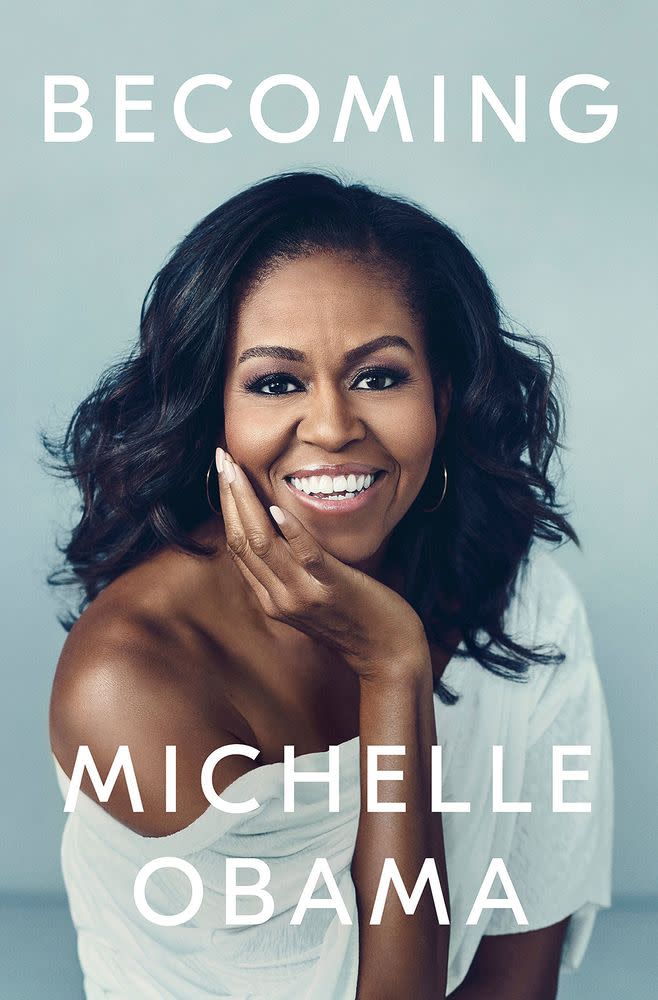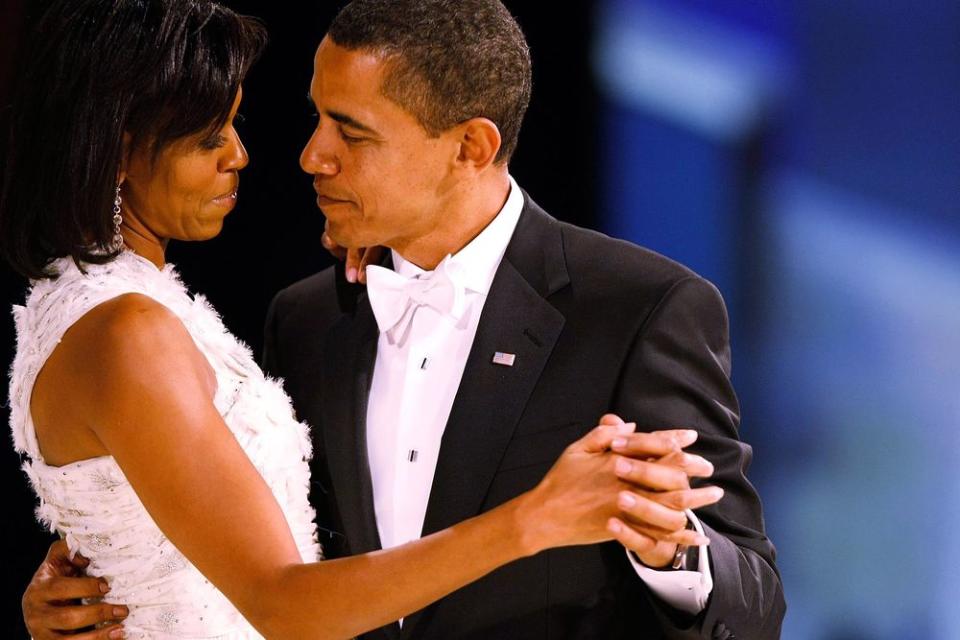Michelle Obama makes decency great again in her memoir Becoming: EW review
Allow Michelle Obama to clear the air. She doesn’t intend to ever run for office. She believes our current president is a “misogynist” whose racist rhetoric put her “family’s safety at risk.” She fears the impact of the president’s recklessness on the country she loves. “I’ve lain awake at night, fuming over what’s come to pass,” Obama writes in her memoir, Becoming. “It’s been distressing to see how the behavior and the political agenda of the current president have caused many Americans to doubt themselves and to doubt and fear one another.”
Becoming arrives like a glass bottle of decency, preserved from a nationwide garbage fire. This is a straightforward, at times rather dry autobiography from a major public figure that stands in remarkably sharp contrast to the state of our discourse — starting with the man in the White House. Yet that contrast isn’t derived from Obama’s scathing commentary on Donald Trump, which is both brief and somewhat expected, but rather, from the rest — as in, the vast majority — of Becoming, which describes one woman’s growth from the South Side of Chicago to First Lady of the United States, through tales of empowerment and overcoming adversity.
What sets Becoming apart is context: Michelle Obama is a black woman, unlike her predecessors, and her book is publishing at a time of unprecedented social division. Thus this latest entrant in the canon of First Lady memoirs — a subgenre themed largely by appeals to unity — can hardly be called apolitical. Every sentence Obama writes makes a statement. This turns out to be especially true because of how little the author deviates from the formula.
The book’s first third, “Becoming Me,” is dedicated to Obama’s upbringing in ‘60s Chicago and her educational development. It can drag, progressing like so many memoirs of its type. But Obama also constructs episodes from her childhood which vividly, subtly capture the experience of growing up black in America: learning of racism’s legacy as she hears her grandfather’s stories, being challenged by a peer for “talking like a white girl,” occupying spaces like piano recitals and, later, Princeton University, where her blackness — “that everyday drain of being in a deep minority” — clarifies itself.

But these are the scenes you’d get in the biopic version: meaty, telegraphed, devoid of subtext. The mechanics can outweigh the story here. Obama’s strength in Becoming lies in hindsight, her ability to take a step back from a specific anecdote, and not only contextualize but ruminate on it, really consider its power. In these asides, that introspection Obama claims to have had as a kid comes into thrilling evidence — as prose. On one difficult teen experience, she writes, “I look back on the discomfort of that moment and recognize the more universal challenge of squaring who you are with where you come from and where you want to go.” One of Becoming’s best passages comes even earlier, in the preface, as Obama details the day of Trump’s inauguration: “A hand goes on a Bible; an oath gets repeated. One president’s furniture gets carried out while another’s comes in. Closets are emptied and refilled in the span of a few hours. Just like that, there are new heads on new pillows — new temperaments, new dreams. And when it ends, when you walk out the door that last time from the world’s most famous address, you’re left in many ways to find yourself again.”
I focus particularly on the book’s opening section because it’s most reflective of how Obama frames Becoming: as a story of where she came from, where she went, and how she carried herself along the way. The author invests in a sort of quintessentially American narrative, but subverts it by not shying away from the realities of race and gender, and finding opportunities for complex, candid reflection.
The bulk of these opportunities, surely, arrive in “Becoming Us” — the book’s second and best section, devoted to her romance with Barack Obama. Again, from a distance, it looks roughly like what we’ve seen from many a First Lady’s public account: the bumps in the road, the difficulty of the spotlight, the durability of their love. But Obama seems determined in Becoming to fully live in the pain, the disappointment, the regret, and the loss she’s felt at various times during their relationship. She interrogates it, picks at it, and reveals to readers what’s underneath.
Just listen to the words she uses. Obama felt “resentment” toward her husband and his commitment to politics after she suffered a miscarriage and, on a doctor’s recommendation, proceeded with IVF treatments to start a family. “Or maybe I was just feeling the acute burden of being female,” she continues. “Either way, he was gone and I was here, carrying the responsibility.” (Earlier, she draws a hauntingly clear picture: “Now here I was in the bathroom of our apartment, trying, in the name of all that want, to screw up the courage to plunge a syringe into my thigh.”) Then there’s when she fell for Barack; she describes the feeling as “a toppling blast of lust, gratitude, fulfillment, wonder.” Obama embraces passionate language periodically, lending Becoming bursts of authenticity.

Overall, Obama plays to the space she and her husband have occupied in the culture — an idyllic, supportive marital unit — brilliantly. She affirms the public perception, that their relationship is happy, healthy, and loving. But she deconstructs what it took — takes — to get there: couples counseling, flickers of doubt, confusion, sacrifice, even loneliness. In laying that aspect of her life most bare — more than her childhood, more than her own legal career and ambitions — Obama persuasively communicates the primacy of her marriage in her life.
Becoming takes a peculiar turn in its final act, as Obama discusses her time in the White House. She ably conveys the confinement she felt — literalized, perhaps, in the saga that was trying to just sit out on the Truman Balcony — and the toll it took on her family. (“This isn’t how families work or how ice cream runs work,” she recalls saying after Secret Service intervened in Malia trying to get ice cream with her friends.) But this extends to her writing. It’s choppy and guarded and, strangely, a bit defensive as she espouses the value of the causes she took up as First Lady. One senses there are layers yet to be peeled here — that the presidency remains relatively raw for Becoming’s author.
But then Becoming is a rather peculiar read throughout. We’re at the end of 2018, a year when the paradigm for Washington memoirs has shifted so dramatically — when a fired FBI Director, a reality TV star, and an award-winning journalist could each top the New York Times best-seller list for the exact same reason: digging up Trump dirt. No one has been able to escape the stench, or if they have, they certainly haven’t sold Fire and Fury-level copies. Leave it to Michelle “When they go low, we go high” Obama to meet the challenge.
She is direct, forceful, and condemnatory when speaking about Trump, but in a fashion that doesn’t sour or alter her own life story. Her honesty translates. More importantly, her intention translates, to remind her country of what’s being lost — what she witnessed during the Obama years, what guided their presidency: “a sense of progress, the comfort of compassion…. A glimmer of the world as it could be.” May decency reign again. B


